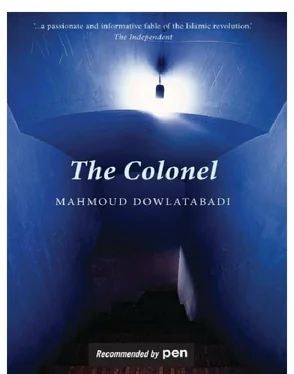If I hadn’t heard the door shut, I’d probably have assumed that he’d just gone into some dark corner to watch me as I lay like a paraplegic on that wire bed. I’d lost all sense of direction, you see. But when I heard the same noise again a few minutes later, I knew that this room wasn’t some hermetically sealed chamber, but was connected by a door with the world outside. It was nothing but madness, sheer madness, it was like living in a bubble of insanity. How else could I have imagined a room without a door?
Now the two of them, Khezr Javid and the monster whom Amir had so disconcerted, were standing there in the pool of light near the wire bed, facing Amir. It turned out that the monster did have a name after all. The two of them were very different in appearance and stature. They were both in the light, but Khezr’s face showed up more than ex-sergeant Ramazani’s, as he towered high above the lampshade. To Amir’s unsteady vision, their bodies appeared to be warping and twisting and turning. Amir now understood why Ramazani had gone out to fetch Khezr the Immortal, and that Khezr was very angry with him, for he picked up the bloodstained knife from the metal table and thrust the point at his throat:
“I’m going to kill you right here and now, you little son of a bitch. You’ve given me the name of a corpse, you creep, you son of a whore.”
It wasn’t my fault that they had murdered Mansour Salaami, or someone else of that name, eleven months before. I just told them everything I knew. But what Amir knew clearly did not satisfy the Immortal Prophet Khezr, who responded with a stream of oaths before handing him back to Ramazani to get him to talk. He then stormed out, in a foul mood.
How naïve I must have been to think that I could get them to tell me about my wife’s arrest by giving Salaami away. Ramazani was getting to work once more; I saw that he had rolled his sleeves a fold higher and, much more agilely than you’d expect from such a giant, walloped me in the face with his great big ham fist. My eyes closed and I just had time to think ‘here we go again, ’when he shouted to two others torturers standing outside to come in. Over the noise of Ramazani’s oaths I heard them rush in. Then I heard him tell them: ‘Put the son of a whore in the clamp. ’
Amir had no chance to think what else he could tell them, as they hauled him off the wire bed like a piece of meat and put him in the clamp, which he had heard vaguely about from the other prisoners who had been through it. Now he saw that it was quite a sophisticated apparatus, brand new, designed to bring concentrated pressure to bear on different parts of the body. It gripped you so tightly that you could not move.
Before they clamped on the steel helmet, which came right down to my chin, I heard the monster once more: “The knife, the knife…” Then silence. I could just see from the movement of his lips that he was still talking about the bloody knife, while beating the soles of my feet with a length of wire cable. I was screaming… screaming. My screams went round and round inside my head, getting louder and louder, deafening me. And the worst of it was that, apart from screaming until my eardrums burst, I couldn’t react in any way to those savage blows from the cable. Both my forearms were fixed immovably to the clamp and both legs were screwed down to two metal bars, so that the slightest movement increased the pressure on my shin or funny bone. Leather straps held my arms and chest tightly against the back of the clamp and I could hardly budge an inch. Every blow from the cable made me jump and all I could do was scream. What else could I do?
“The knife… the knife… this bloody knife!”
The words echoed in the pit of Amir’s mind. He was incapable of thought, as every cell in his brain was focused on enduring the blows to the soles of his feet and the rest of his body. He was thirsty and his mouth was dry. He had no idea what time of day or night it was, what day it was, or where on earth he could be, so totally isolated, alone and exposed. He was giddy, dizzy, as if he had had a shot of morphine against this never-ending pain. His whole brain felt paralysed. Then suddenly, as if in his death agony, he heard a different sound, one that didn’t seem to come from him, like the dull thud of a stick on a bale of wool.
It was like the end of a party, or a wedding or a wake, I don’t know which. I didn’t have a watch on. Or did I? Maybe I did, but if so it had stopped, and I can only guess that it was around midnight. I was taking good care of my new blue suit, which I was wearing for the first time. This may have been why I had come to Tehran, to see my wife Nur-Aqdas — or were we still just engaged? She was still at university, renting a room with a tiny kitchen in an aunt’s house. As usual, I was a bit confused, and I was standing at the top step of the hallway in an old house. There was a cheap carpet runner on the floor and I saw Mansour Salaami who had, apparently, just come into the hall. He had the bloody knife in his hand and he was pointing it at my throat. It didn’t strike me then how odd it was that he still managed to stab me, right in the throat, even though I was standing with my back glued to the wall in terror, and he was on the bottom step. The distorted perspective seemed perfectly normal to me. Nor was I surprised when I saw not one but two Salaamis. One of them grabbed the other’s hand and forced him to drop the bloodstained knife at my feet, right on the top step. Mansour Salaami seemed drunk. With his jacket slung casually over his shoulder like any Jack the Lad, he went past me. My face must have been as white as the whitewash on the wall. The other Mansour Salaami was right behind him, as if he were controlling him. As he brushed past my chest he looked at me. There was a complicit expression on his face as he pointed at the other one, who was just about to hide behind an old folding screen:
“Anyway, it was a good thing. He nailed the bastard right in the heart and got his sister, too.”
“Whose sister?”
“The chief of police’s.”
Rooted to the spot, Amir watched Mansour Salaami disappear behind the screen. In a blind panic, he ran down the stairs two at a time to get away from the scene and get to Nur-Aqdas’s house. He was worried that he would not find transport. He knew that the buses stopped running at eleven and he might not find a taxi at that hour either. He came out of the narrow alley in Amirieh, got to the end of the pavement, crossed the gutter and the kerb into the main road and kept running up it to the bus station in Sepah Square, looking back all the time to see if he could catch a taxi coming up. I was going uphill with my feet and looking back with my eyes. You could say I was going to a bus that wasn’t there and looking for a taxi that wasn’t coming. The car that Amir eventually flagged down turned out not to be a taxi. He realised his mistake as it came to a halt just behind him; it was an old banger, painted a strange mix of green and rusty blue, a combination of colours that Amir had never seen in his life. The back door opened. The interior light went on and Amir could make out a woman. She got out and he saw her go down the same alley he had just come out of. There were four young men in the car, tittering lasciviously. Amir didn’t want to miss his chance. He went up to the car to give them the address of where he wanted to go — he didn’t know where it was — to see if they could take him there. But just as he was about to open his mouth, there was another burst of raucous laughter from the rowdy young men. As if trying to take the piss, they started driving past him really slowly and made off. Amir looked round to see where the woman had gone. She was just turning into the alleyway. Not young, she was plumpish and was wearing a cream-coloured scarf on her head and carrying a blue bag in her hand. She seemed to be heading for the house that he had come out of. She didn’t look anything like Nur-Aqdas.
Читать дальше












